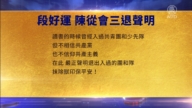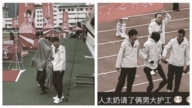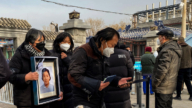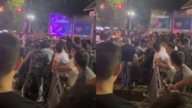【新唐人2012年6月26日訊】5月的一個星期日,北京「景山公園」裡,有群眾唱起了《洪湖水浪打浪》。在薄熙來剛下臺時一度在重慶和北京被禁止的「公園紅歌會」,後來恢復了,引發海外媒體的討論。
有些愛唱紅歌的人表示,他們並不認同那些政治性歌詞,而是喜歡那熟悉而好聽的曲調。所以對紅歌裡歌頌中共的歌詞,或者跳過不唱,或者改成其他歌詞。
例如《洪湖水浪打浪》歌詞有一句:「共產黨的恩情比那東海深,像太陽。」台灣歌手謝採妘錄製這首歌時,把歌詞裡的「共產黨」改成了「爹娘」。而被稱為 江澤民情婦的宋祖英在美國演唱這首歌時,唱的也是「爹娘的恩情比那東海深」,去掉了「共產黨」的內容。
中國大陸電視導演:「到美國這樣一個意識形態的氛圍裡面,它覺得拿國內的這樣一種宣傳方式去唱,可能不是那麼討好,不是那麼受歡迎,可能換一個比較人性化的處理,它是想淡化一下這種意識形態和政治色彩。」
「紅歌」和「樣板戲」,作為毛澤東時代的遺物,被很多在文革中遭受批鬥迫害的人們所厭惡。但從另外一個角度上說,這些中老年人的青春時代,除了接受當時中共強加的這種「革命」和「愛黨」教育灌輸,沒有其它文藝形式可以選擇。
大陸一名不願透露姓名的電視導演向《新唐人》表示,很多中老年人已經過了學唱歌曲的年齡,只熟悉自己青少年時代被灌輸的那些紅色歌曲。
中國大陸電視導演:「他們沒有甚麼太多可唱的,像《洪湖水浪打浪》在這一代人的成長過程中,它已經是比較抒情的一種曲調了。那你這個時代你還讓他唱甚麼?這個十年、二十年產生的那些超女的歌曲,老人家也唱不了。所以說他還是這個,跟他的懷舊也好,跟他過去可以唱的歌曲資源裡邊非常有限也有關係。」
「華龍網傳媒公司」簽約公益歌手楊銀波表示,那個年代的人被灌輸了這種文化,但每個人唱紅歌的初衷不一樣,現在唱紅歌並不代表贊同當年那種上綱上線的政治形態。
「華龍網傳媒公司」歌手 楊銀波:「老年人的詮釋,那有懷舊的﹔還有一些個,藉著這個紅歌裡面的所謂純潔性,來對現在當下的現實表達不滿﹔還有的就壓根兒沒想甚麼政治形態,就是純粹是業餘愛好,因為他們對當下的流行文化有一個隔膜在。」
楊銀波在重慶目睹了整個「唱紅打黑」的過程,一直在思考紅歌問題,他指出,尤其在六四之後,《血染的風采》這首歌曾經被香港歌星梅艷芳翻唱,也被當時的年輕人所傳唱,體現了年輕人對愛國的詮釋。他認為,目前在海外「紅歌」沒有市場,因此中共派人出來表演,也只能打「家鄉情懷」這張牌。
楊銀波「因為現在全世界共產主義陣營這一塊是越來越稀缺了,就是大家快把它忘掉了,所以它已經是一個很過時的東西,我理解這首歌就是一個家鄉情,僅此而已。」
「紅歌」因為具有政治性和煽動性,而被中共作為意識形態的一種武器,但具有諷刺意義的是,紅歌也表現出抨擊專制制度雙向性的作用。
獨立評論員 洪劍「只能說明中共是個徹頭徹尾的邪教,它那個獨裁,對民眾的洗腦後,老百姓已經被黨文化所 精神控制 ,已經不知道,真正的中華民族的文化是甚麼?體會不到那五千年傳統文化的博大精深和偉大。」
獨立評論員洪劍表示,經歷過毛時代的人喜愛唱歌,卻沒有歌可唱,是文化的悲哀。
採訪/常春 編輯/尚燕 後製/肖顏
Red Songs Express Nothing but Nostalgia
One Sunday in May, Beijing Jingshan Park saw a group singing
“Waves in Lake Hong”, and a “red” song eulogizing CCP.
Red-song park gatherings were previously banned in Beijing and
Chongqing after Bo Xilai stepped down.
Its current revival calls for attention from global media.
Some from the group of singers said they did not really agree
with the political messages in the lyrics,
though they did enjoy the familiar tunes. They actually
skipped the lyrics in praise of CCP or changed them.
For example, “Waves in Lake Hong” includes a line “The
Party’s favor is deeper than East China Sea, and is like the sun."
Taiwanese singer Michelle Hsieh changed the “Party”
in the lyric into “parents.”
So did Song Zuying, known as Jiang Zemin’s
mistress, when she sang this song in the United States.
They both removed the contents about Communism.
Mainland TV Director: “She must have felt it inappropriate
to bring Mainland China’s propaganda to America to sing the red songs.
So she changed it into a more human way to play down the
ideological and political overtones.”
“Red song” and “model operas",
both products of the Mao period,
have been detested by people who suffered
during the Cultural Revolution.
From another point of view, however, that generation of
Chinese people had no alternative art form outside such “revolutionary" and “patriotic" art education.
A Mainland TV director who chooses to be anonymous told
NTD that many people are already too old to learn new songs.
The only songs they are familiar with are the red songs they
learned when young.
Mainland Chinese TV Director: “They do not have choices
about what to sing.
Songs like “Waves in Lake Hong” are already red songs
with more sentiments than political color.
At the current time, what other songs can you
expect them to sing?
The popular song in the past two decades are
beyond the old generation’s ability to learn.
They can only sing such red songs because of both their nostalgia
and the limited number of songs they are familiar with.”
Yang Yinbo, singer with CQ News Media said, although people
of that generation were instilled with some propaganda,
each individual had his own take of the red songs.
When people now sing those songs, it doesn’t mean they
agree with the extremist political atmosphere of that time.
Yang Yinbo, singer with CQ News Media: “Some elderly
people sing the red songs out of nostalgia,
others resort to them as a way of criticizing the current situation,
still others have no sense of ideology and only take singing as a hobby.
They are isolated from the current popular culture.”
Yang Yinbo witnessed the movement of “sing the red and
strike the black" in Chongqing.
After the June Fourth movement, the song “Bloodstained Glory”
became popular among the young, especially after the introduction by Hong Kong singer Anita Mui.
It embodied the patriotism of the young generation.
He believes that current red songs have no market outside China,
so CCP can only resort to nostalgia to promote those songs.
Yang Yinbo: “Now global Communism is becoming
increasingly weak, almost forgotten by many, so it is already outdated.
I understand that the red songs are only an expression of
homesickness.”
Due to their power of political propaganda, red songs have been
used by CCP to be an ideological weapon.
Ironically, red songs also serve to criticize the autocratic system.
Independent critic Hong Jian: “This only proves that
CCP is a completely evil cult.
After its brainwashing, Chinese people have been controlled
by the Party Culture,
unaware of the authentic and profound Chinese tradition
of the past 5000 years.”
Independent critic Hong Jian said that people who grew up
from the Mao era loved singing but had no songs to sing, which is indeed a pity.



























